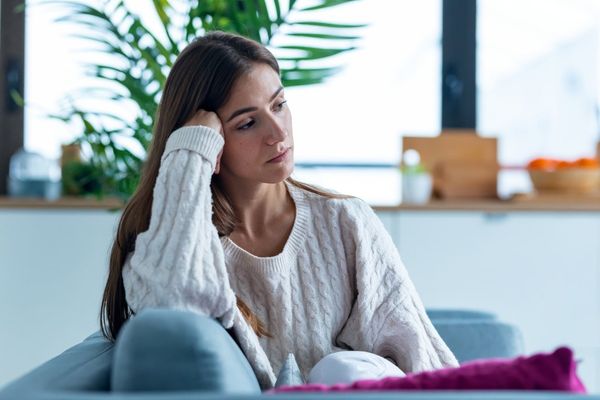When Lisa Stone resigned from her job in February, she expected to take some time to rest and figure out her next move. The married mother of two, who planned to take three months off, says she appreciated having the luxury to pause before re-entering the workforce. Then coronavirus happened.
“Now I’m at home and became a teacher overnight to my first and fourth graders, and I’ve realized that I’m not a teacher,” Stone said from her home on Long Island. “Teachers are saints.”
Stone’s husband works from his home office during the day while she takes care of their 9-year-old daughter and 7-year-old son, which can be stressful.
“Everything is a negotiation,” Stone said. “I’ll tell my kids that if they let me read for half an hour, I’ll play any board game they want.”
She added that her children are very social and want to be with their friends. On a typical day (without a pandemic) they fight, and being confined with only each other as playmates is taking its toll.
Whether you’re quarantining with a friend, partner or entire family, the reality is that there is going to be a shift in the dynamic. Under normal circumstances, even close families don’t spend every waking moment together. We’re all accustomed to spending time alone and socializing with friends or colleagues away from home.
“Moving towards a new normal and making that a regular thing can be really helpful,” explained Jennifer Payne, M.D., director of the Women’s Mood Disorder Center at The Johns Hopkins Hospital and a member of HealthyWomen's Women's Health Advisory Council. “When families are cooped up together [they] have to figure out a new group dynamic. Kids may have to do more chores than they usually do so they are part of the group.”
Stone’s kids are learning to do their own laundry, and are expected to do their usual chores more often.
“Instead of straightening up the playroom once or twice a week, they have to do it at least every other day. Same with their bedrooms. Now that they’re in this house basically 24/7, it gets messier faster,” Stone said. “There is a lot of discussion around how being a family means being a team. They see my husband help me clean up after dinner and we tell them that everyone pitches in.”
Different Coping Strategies
When the pandemic hit, Dylan Beckman fled her studio in Brooklyn for an apartment over her mother’s garage in Houston. The 25-year-old photographer is now living at home again, and Beckman says she feels irritated by her mom and sister, who share the Houston house.
“I feel like I automatically regress to my teenage self and can’t help it,” Beckman said. “I’m moody, easily annoyed and always complaining.”
If that weren’t enough, Beckman brought her boyfriend. Now the two are living together for the first time, and she is trying to honor their unique coping styles.
“I’ve learned how differently we deal with uncertainty. I get kind of irritable and particular and feel the need to be in control, and he gets sad about the state of the world,” said Beckman, who exercises six days a week to relieve stress.
Payne explained that stress and anxiety are totally normal during this time period, and everyone copes differently.
“Sometimes people have very similar coping styles and sometimes they have very different coping styles, and both of those have pros and cons,” Payne said. “If you have a similar coping style to your partner, that can be helpful in that you do things together but that may also mean that there are areas that you fail in together.”
She emphasized that the key to maintaining healthy relationships in close quarters is figuring out how to manage stress.
But that’s easier said than done. Rena Ferguson, M.D., a psychiatrist at the TMS Hope Center of Long Island, and a member of HealthyWomen's Women's Health Advisory Council, characterized confinement as “the ultimate team building exercise.”
“Peace among people is ever-shifting so be aware of the dynamics and your contribution,” Ferguson said, adding that people express themselves according to “genetics, experiences and our sense of safety.”
Embracing the Positive
While Stone said that she’s feeling the stress of being both teacher and mother to her children, she also appreciates the fact that they have more time as a family. Due to her husband's 90-minute commute each way to work, he normally isn’t home for dinner during the week.
“Now we eat dinner together every night,” said Stone. “It’s such a treat and we sit longer. I’ll mourn the loss of that time together when we go back to normal.”
Eventually, the world will re-open and we’ll have more personal space — and perhaps less conflict. In the meantime, here are some tips for coping and keeping the peace.
Practice acceptance. Stress is a normal reaction to this crisis. Don’t feel bad or guilty about your negative emotions.
Everyone copes differently. Coping styles and skills are as diverse as we are. Recognize how you tend to cope, and how that is similar or different from your loved ones.
Communicate and compromise. Talk to each other about how you’re feeling and how you’re acting. Negotiate a mix of family time and solo time.
Manage stress. Develop new self-care strategies and set clear routines for everyone in the house. Take extra care if you are living with a preexisting illness or disorder that limits your ability to cope with extra stress. Beyond My Battle has an excellent resource kit for chronically ill folks managing COVID-19 stress.
Stay safe. Domestic and child abuse are on the rise as a result of stay at home orders. If you or someone you know feels physically or mentally unsafe in their confined living situation, there are a number of resources to help. The National Domestic Violence Hotline offers several contact methods: Call 800-799-7233 or visit the website, which has online chat support available around the clock. If you need help with other types of violence or mental health issues, text the Crisis Text Line at 741741.







